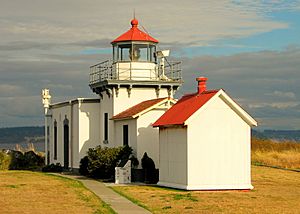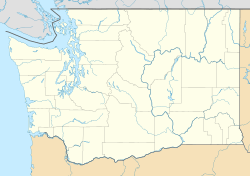Point No Point Light (Washington) facts for kids
 |
|
|
|
|
| Location | Hansville, Washington |
|---|---|
| Coordinates | 47°54′44″N 122°31′36″W / 47.9123°N 122.5268°W |
| Year first constructed | 1879 |
| Year first lit | 1880 |
| Automated | 1977 |
| Foundation | Masonry |
| Construction | Brick and stucco |
| Tower shape | Square |
| Height | 30 feet (9.1 m) |
| Focal height | 27 feet (8.2 m) |
| Original lens | Fifth order Fresnel lens (1880); Fourth order Fresnel lens (1898) |
| Characteristic | 3 white flashes every 10 s |
The Point No Point Light is a historic lighthouse in Washington state. It stands on the northeastern tip of the Kitsap Peninsula. This spot is where Admiralty Inlet meets Puget Sound. The lighthouse helps ships find their way. It is near the small town of Hansville. This lighthouse is the oldest one on Puget Sound. It is also listed on the National Register of Historic Places.
Contents
History of the Lighthouse
Local officials first wanted to build the lighthouse further north. But they decided on the Point No Point location. The land owners were not eager to sell their property. Reports vary on the final sale. Some say it was 10 acres (4.0 ha) for $1,000. Others say it was 40 acres (16 ha) for $1,000 or even $1,800.
Building the Lighthouse
Construction of the lighthouse started in April 1879. The first light came from a kerosene lamp. As 1879 ended, the special lens and glass for the light had not arrived. So, the first lighthouse keeper, J.S. Maggs, had to be creative. He was a Seattle dentist. He hung a canvas over the south windows. This helped block the wind and kept the kerosene lamp from blowing out.
Lighthouse Features Over Time
The light station was finished in February 1880. The room holding the light had a fifth-order Fresnel lens. This is a special lens that makes the light very bright. The original stone building was 27 feet (8.2 m) tall. Today, the 30-foot (9.1 m) brick and stucco tower is square. It stands between the office and the fog signal building.
A fog signal was added in April 1880. This signal had been used at the New Dungeness Lighthouse. In 1900, a Daboll trumpet replaced the fog bell. This trumpet made a loud sound to warn ships in foggy weather. For its first 40 years, there were no roads to the lighthouse. All supplies had to be brought in by boat.
Lens Changes and Damage
In 1898, the original lens was replaced. A fourth-order fresnel lens was put in. This lens is still there, but it is not used anymore. A popular story says lightning struck the lighthouse in 1931. People thought this caused the lens to crack. However, records show something different happened. A faulty oil tube caused explosive vapors to build up. This damaged the lens and the tower. The tower needed repairs and new copper tubing.
Modern Updates and Automation
In 1975, a 90-foot (27 m) radar tower was built near the lighthouse. This tower is used for the Vessel Traffic Service (VTS). This system helps manage ship traffic. In 1977, the lighthouse became fully automated. This meant it no longer needed many keepers. Only one keeper was needed at the station. The Coast Guard replaced the light in 2006. They installed a new, low-maintenance light on a post.
Point No Point Park
In 1997, the last Coast Guard workers left Point No Point. The lighthouse stood empty for a while. Then, Kitsap County Parks and Recreation leased it. The county bought more land nearby. They created the 60-acre (24 ha) Point No Point Lighthouse and Park. In 2012, the Department of the Interior officially gave ownership of the lighthouse to Kitsap County.
Since 2008, the keeper's quarters at the station have been used for something special. They are the national headquarters for the United States Lighthouse Society. This group is a nonprofit organization. They work to preserve lighthouses and teach people about them.
- Strait History, the quarterly publication of the Clallam County Historical Society and Museum, 1(4).
 | Lonnie Johnson |
 | Granville Woods |
 | Lewis Howard Latimer |
 | James West |



